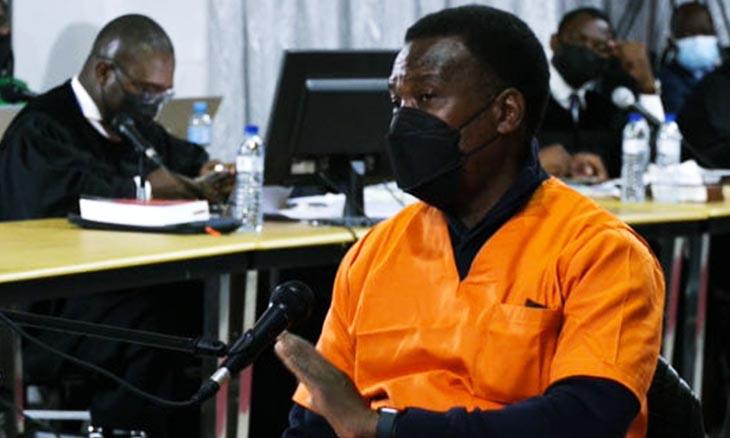Africa-Press – Mozambique. Teofilo Nhangumele, a Mozambican businessman who is one of 19 people charged with crimes related to the scandal of Mozambique’s “hidden debts”, told the Maputo City Court on Friday that “I was just a facilitator”, in the contacts in 2011-2013 between the Mozambican authorities and the Middle Eastern group, Privinvest.
It was Privinvest that became the sole contractor for the three fraudulent, security-related Mozambican companies, Proindicus, Ematum (Mozambican Tuna Company) and MAM (Mozambique Asset Management), which obtained 2.2 billon dollars in loans from the banks Credit Suisse and VTB of Russia, on the basis of illicit loan guarantees from the government of the day, headed by the then President, Armando Guebuza.
Nhangumele was in at the start of the scheme, designing a coastal protection project, together with his close friend, Cipriano Mutota, the director of the Projects and Studies Office of the State Security and Intelligence Service (SISE), and Jean Boustani, a senior Privinvest salesperson.
But who was Nhangumele, and how did he come to have such close ties with SISE? Filipe Sitoe, of the Mozambique Bar Association (OAM), which is attending the trial as an assistant to the Public Prosecutor’s Office, asked these questions repeatedly, but received no satisfactory answer.
“Did you know you were working for SISE?”, Sitoe asked. “I never worked for SISE, I just worked with Mutota”, replied Nhangumele.
“But you knew Mutota was a SISE officer. Are you aware of the nature of the security and intelligence service”, asked the lawyer. “No”, came the reply.
Asked about his role in the coastal protection project, Nhangumele said, repeatedly, that he was “a facilitator”
“I did not report to SISE”, he insisted. As for his attendance at a meeting with the Defence and Interior Ministers, and the General Director of SISE, he was just there “as a facilitator”.
He admitted that he had come up with the name of the first of the fraudulent companies, Proindicus (which is short for “Protection of the Indian Ocean”), and had done some of the paperwork for the formalization of Proindicus, but claimed this was part of the normal task of a facilitator.
Nhangumele signed a contract as a consultant with Privinvest in January 2012. He admitted that he had never told the Mozambican authorities that he was now employed by the very company they were negotiating with.
He could not see any conflict of interest. “I was not a facilitator for just one side. I work for all sides”, he said. “I don’t think in terms of sides, but of objectives”.
Asked who he was accountable to – to the Mozambican authorities, to Privinvest, to Boustani? – Nhangumele replied “I don’t provide accounts of myself to anybody. I’m just a facilitator. I don’t know what accountability means”.
At some of the early meetings between Privinvest and government officials in Maputo, Nhangumele worked as a translator. Asked how much he was paid for this service, he said “I didn’t have a wage”.
But he did have what was euphemistically called a “success fee”. Prinvest paid a bribe of 8.5 million dollars in March 2013 into a bank account he had opened in Abu Dhabi. The bribe would have been 10 million dollars, but Ndambi Guebuza, the oldest son of the President, wanted more money for himself (supposedly to pay off other officials), and so 1.5 million dollars was transferred from Nhangumele’s “fee” to Guebuza Junior’s account.
The “success” was merely that Boustani, with his Mozambican friends, had persuaded the Mozambican government to buy assets such as radars and patrol boats from Privinvest. When Proindicus itself took off, it was far from a success, and has played no role in maritime security. Most of the Proindicus boats are now abandoned on a beach in the northern city of Pemba.
Nhangumele insisted that the money he was paid came from Privinvest, not from Proindicus. At this, the judge, Efigenio Baptista, intervened to point out that Proindicus was financed by a 622 million dollar loan from Credit Suisse. So the “fees” paid to Nhangumele, Guebuza Junior and others were in reality skimmed off from the Credit Suisse loan (which was sent, not to Mozambique, but directly to Privinvest).
Asked if he intended to return any of the money to the Mozambican state, since he had participated in “the greatest financial scandal in Mozambican history”, Nhangumele denied he had done anything wrong. “There’s no truth in your words”, he told the lawyer.
The lawyer for Ndambi Guebuza, Alexandre Chivale, noted that Nhangumele had worked for five years at the British embassy in Maputo, and suggested that he might be a British spy. “Have you never hear of MI6?”, he asked.
“Isn’t it strange that someone who worked for the British state ends up working on a Mozambican security project?”, wondered Chivale.
Somebody else suspicious of Nhangumele was the then Defence Minister (now President) Filipe Nyusi. When Nyusi, in December 2012, found that this mysterious civilian was working on a security project, Nyusi ordered him to be removed, on the grounds that only members of the defence and security forces should be involved.
But despite this clear instruction, Nhangumele continued to work on the projects with officials of the Finance Ministry.
“It was Boustani who told me to attend Finance Ministry meetings”, he said. “I don’t see any problem”.






